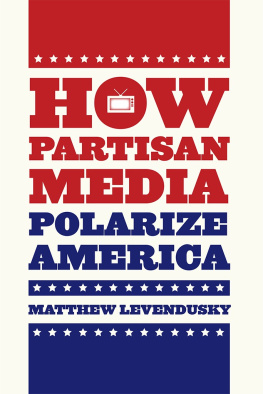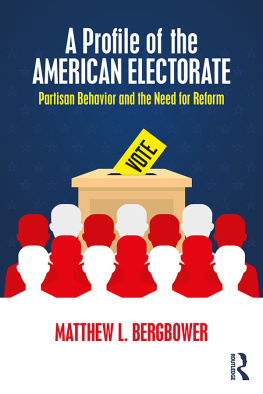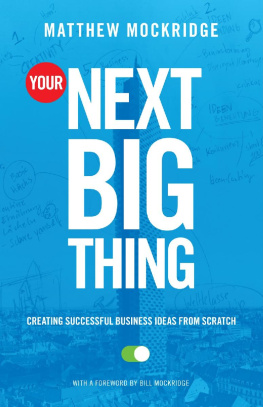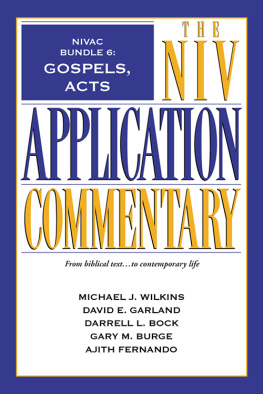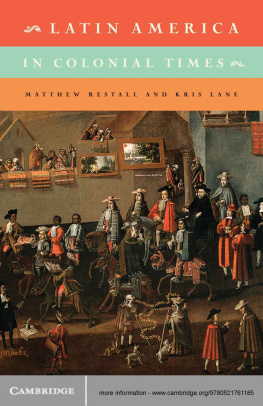MATTHEW LEVENDUSKY is assistant professor of political science at the University of Pennsylvania and the author of The Partisan Sort, also published by the University of Chicago Press.
The University of Chicago Press, Chicago 60637
The University of Chicago Press, Ltd., London
2013 by The University of Chicago
All rights reserved. Published 2013.
Printed in the United States of America
22 21 20 19 18 17 16 15 14 13 1 2 3 4 5
ISBN-13: 978-0-226-06896-1 (cloth)
ISBN-13: 978-0-226-06901-2 (paper)
ISBN-13: 978-0-226-06915-9 (e-book)
DOI: 10.7208/9780226069159
Library of Congress Cataloging-in-Publication Data
Levendusky, Matthew, author.
Partisan news that matters : how cable media polarize politics / Matthew Levendusky.
pages; cm.(Chicago studies in American politics)
Includes bibliographical references and index.
ISBN 978-0-226-06896-1 (cloth : alkaline paper)
ISBN 978-0-226-06901-2 (paperback : alkaline paper)
ISBN 978-0-226-06915-9 (e-book) 1. Television broadcasting of newsPolitical aspectsUnited States. 2. Television in politicsUnited States. 3. Mass media and public opinionUnited States. 4. Opposition (Political science)United States. 5. Polarization (Social sciences)United States. I. Title. II. Series: Chicago studies in American politics.
P95.82.U6L48 2013
302.230973dc23
2013005366

This paper meets the requirements of ANSI/NISO Z39.48-1992 (Permanence of Paper).
How Partisan Media Polarize America
MATTHEW LEVENDUSKY
THE UNIVERSITY OF CHICAGO PRESS
CHICAGO AND LONDON
Chicago Studies in American Politics
A SERIES EDITED BY BENJAMIN I. PAGE, SUSAN HERBST, LAWRENCE R. JACOBS, AND ADAM BERINSKY
Also in the series:
CHANGING MINDS OR CHANGING CHANNELS? PARTISAN NEWS IN AN AGE OF CHOICE by Kevin Arceneaux and Martin Johnson
THE POLITICS OF BELONGING: RACE, PUBLIC OPINION, AND IMMIGRATION by Natalie Masuoka and Jane Junn
POLITICAL TONE: HOW LEADERS TALK AND WHY by Roderick P. Hart, Jay P. Childers, and Colene J. Lind
THE TIMELINE OF PRESIDENTIAL ELECTIONS: HOW CAMPAIGNS DO (AND DO NOT) MATTER by Robert S. Erikson and Christopher Wlezien
LEARNING WHILE GOVERNING: EXPERTISE AND ACCOUNTABILITY IN THE EXECUTIVE BRANCH by Sean Gailmard and John W. Patty
ELECTING JUDGES: THE SURPRISING EFFECTS OF CAMPAIGNING ON JUDICIAL LEGITIMACY by James L. Gibson
FOLLOW THE LEADER? HOW VOTERS RESPOND TO POLITICIANS POLICIES AND PERFORMANCE by Gabriel S. Lenz
THE SOCIAL CITIZEN: PEER NETWORKS AND POLITICAL BEHAVIOR by Betsy Sinclair
THE SUBMERGED STATE: HOW INVISIBLE GOVERNMENT POLICIES UNDERMINE AMERICAN DEMOCRACY by Suzanne Mettler
DISCIPLINING THE POOR: NEOLIBERAL PATERNALISM AND THE PERSISTENT POWER OF RACE by Joe Soss, Richard C. Fording, and Sanford F. Schram
WHY PARTIES? A SECOND LOOK by John H. Aldrich
NEWS THAT MATTERS: TELEVISION AND AMERICAN OPINION, UPDATED EDITION by Shanto Iyengar and Donald R. Kinder
SELLING FEAR: COUNTERTERRORISM, THE MEDIA, AND PUBLIC OPINION by Brigitte L. Nacos, Yaeli Bloch-Elkon, and Robert Y. Shapiro
OBAMAS RACE: THE 2008 ELECTION AND THE DREAM OF A POST-RACIAL AMERICA by Michael Tesler and David O. Sears
FILIBUSTERING: A POLITICAL HISTORY OF OBSTRUCTION IN THE HOUSE AND SENATE by Gregory Koger
IN TIME OF WAR: UNDERSTANDING AMERICAN PUBLIC OPINION FROM WORLD WAR II TO IRAQ by Adam J. Berinsky
US AGAINST THEM: ETHNOCENTRIC FOUNDATIONS OF AMERICAN OPINION by Donald R. Kinder and Cindy D. Kam
THE PARTISAN SORT: HOW LIBERALS BECAME DEMOCRATS AND CONSERVATIVES BECAME REPUBLICANS by Matthew Levendusky
DEMOCRACY AT RISK: HOW TERRORIST THREATS AFFECT THE PUBLIC by Jennifer L. Merolla and Elizabeth J. Zechmeister
AGENDAS AND INSTABILITY IN AMERICAN POLITICS, SECOND EDITION by Frank R. Baumgartner and Bryan D. Jones
THE PRIVATE ABUSE OF THE PUBLIC INTEREST by Lawrence D. Brown and Lawrence R. Jacobs
THE PARTY DECIDES: PRESIDENTIAL NOMINATIONS BEFORE AND AFTER REFORM by Marty Cohen, David Karol, Hans Noel, and John Zaller
SAME SEX, DIFFERENT POLITICS: SUCCESS AND FAILURE IN THE STRUGGLES OVER GAY RIGHTS by Gary Mucciaroni
Contents
Acknowledgments
Writing a book is not an easy task, and in the process, one accumulates debts that are unlikely to be repaid, at least in the short term. This was true of my first book, and in many ways is even truer of this one. At a purely practical level, my firstand greatestdebt is to the University of Pennsylvanias vice provost for research and the School of Arts and Sciences for funding my research. Without their generous support, this work would simply not be possible. I am also very grateful to the staff of the Wharton Behavioral Lab for helping to plan and implement some of the experiments used in this book.
I owe great thanks to the vast numbers of scholars who commented on this project at various stages: Jim Adams, Kevin Arceneaux, Paul Beck, Adam Berinsky, John Bullock, Bob Erikson, Stanley Feldman, John Gasper, Avery Goldstein, Don Green, Greg Huber, Luke Keele, Jonathan Ladd, John Lapinski, Gabe Lenz, Diana Mutz, Lilach Nir, Jeremy Pope, Markus Prior, Rogers Smith, Paul Sniderman, Laura Stoker, Josh Tucker, and many, many others. I am also grateful to a number of seminar audiences for their penetrating comments on this work; parts of this project were presented at the American Political Science Association and Midwest Political Science Association conferences, as well as at Berkeley, MIT, Northwestern, NYU Center for Experimental Social Science, Penn, and Stanford.
Four other groups of people deserve particular accolades. First, I owe a special thanks to my next-door office neighbors: Neil Malhotra and Marc Meredith. Both have heard far, far more about this project that they ever thought they would. I thank them for always being willing to let me discuss one more idea, no matter how half-baked. Second, Jamie Druckman has gone above and beyond the call of duty again and again. Not only did he help me renavigate the publication process at the University of Chicago Press, he also read the manuscript multiple times and offered detailed and thoughtful advice on nearly every part of it, thereby improving the final product a great deal. I owe him a profound debt that I will never be able to fully repay. Third, Skip Lupia and Matt Baum agreed to serve as discussants at a work-in-progress seminar held at the University of Pennsylvania in the spring of 2012. They both provided incredibly detailed and thoughtful comments on the work, and helped make the final product more persuasive and readable. Finally, I owe the manuscripts referees from the University of Chicago Press a debt of thanks for their helpful and engaged reading of it. Their comments improved the final product a great deal, as did comments on parts of the manuscript from referees and editors at the American Political Science Review, American Journal of Political Science, and Political Communication. To these and many others who Im forgetting (forgive me!), I extend my deepest thanks.
Oh, and Patrick and Michael: sorry for forgetting about you the first time around. Hope this makes up for it.
 This paper meets the requirements of ANSI/NISO Z39.48-1992 (Permanence of Paper).
This paper meets the requirements of ANSI/NISO Z39.48-1992 (Permanence of Paper).
